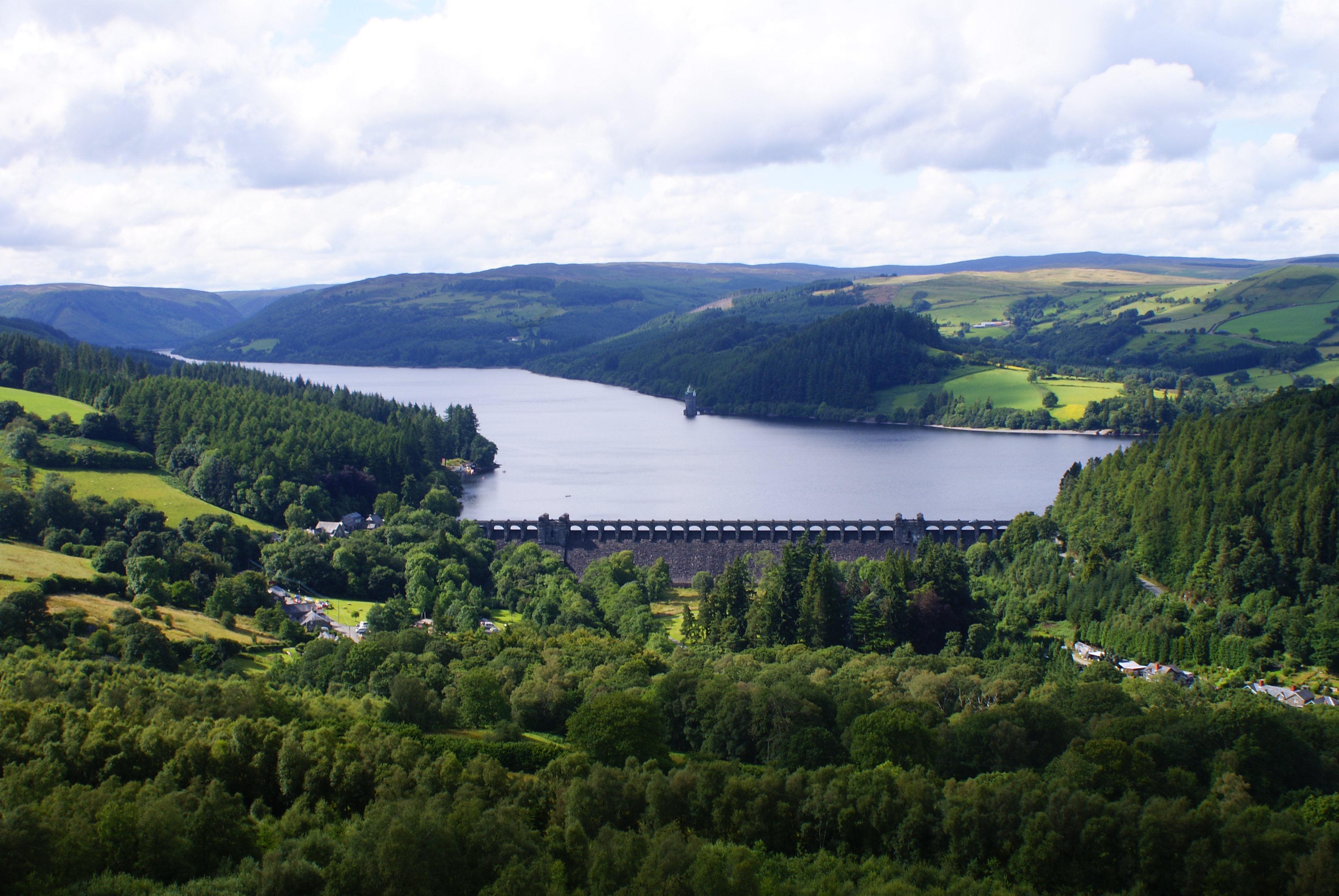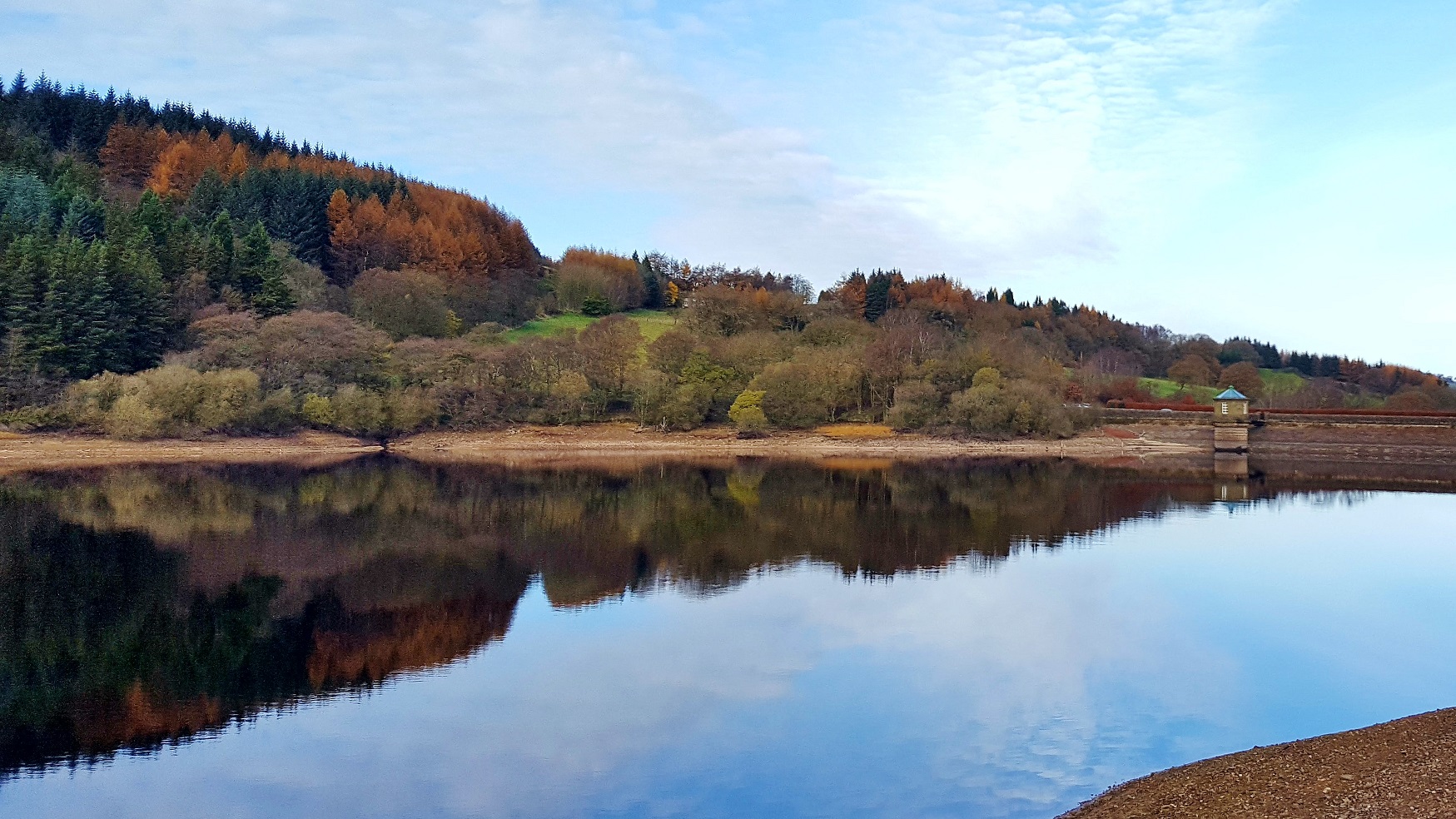|
Digley Reservoir
Digley Reservoir is a lake located downstream of Bilberry Reservoir, south west of Holmfirth, in West Yorkshire, England. The reservoir was planned during the 1930s, with much land being bought for its construction, but it was not completed until 1954. History A bill was presented before Parliament in October 1936 to enable the Huddersfield Corporation to build a reservoir at Digley, impounding Digley Brook. This was passed in July 1937 and required the purchase of several buildings, including two mills and a pub (the Isle of Skye Inn), though one of the mills was derelict. The reservoir did not open until 1954. Recreation The area is associated with the TV sitcom ‘Last of the Summer Wine’, which was filmed in Holmfirth and the surrounding areas. The reservoir has a picnic area, two free car parks and there are also some benches around the lake that provide a quiet place of reflection. There are two main walking routes, the long walking route is and goes as far as Blackp ... [...More Info...] [...Related Items...] OR: [Wikipedia] [Google] [Baidu] |
West Yorkshire
West Yorkshire is a metropolitan and ceremonial county in the Yorkshire and Humber Region of England. It is an inland and upland county having eastward-draining valleys while taking in the moors of the Pennines. West Yorkshire came into existence as a metropolitan county in 1974 after the reorganisation of the Local Government Act 1972 which saw it formed from a large part of the West Riding of Yorkshire. The county had a recorded population of 2.3 million in the 2011 Census making it the fourth-largest by population in England. The largest towns are Huddersfield, Castleford, Batley, Bingley, Pontefract, Halifax, Brighouse, Keighley, Pudsey, Morley and Dewsbury. The three cities of West Yorkshire are Bradford, Leeds and Wakefield. West Yorkshire consists of five metropolitan boroughs (City of Bradford, Calderdale, Kirklees, City of Leeds and City of Wakefield); it is bordered by the counties of Derbyshire to the south, Greater Manchester to the south-west, Lancash ... [...More Info...] [...Related Items...] OR: [Wikipedia] [Google] [Baidu] |
Reservoir
A reservoir (; from French ''réservoir'' ) is an enlarged lake behind a dam. Such a dam may be either artificial, built to store fresh water or it may be a natural formation. Reservoirs can be created in a number of ways, including controlling a watercourse that drains an existing body of water, interrupting a watercourse to form an embayment within it, through excavation, or building any number of retaining walls or levees. In other contexts, "reservoirs" may refer to storage spaces for various fluids; they may hold liquids or gasses, including hydrocarbons. ''Tank reservoirs'' store these in ground-level, elevated, or buried tanks. Tank reservoirs for water are also called cisterns. Most underground reservoirs are used to store liquids, principally either water or petroleum. Types Dammed valleys Dammed reservoirs are artificial lakes created and controlled by a dam A dam is a barrier that stops or restricts the flow of surface water or underground streams ... [...More Info...] [...Related Items...] OR: [Wikipedia] [Google] [Baidu] |
Holmfirth
Holmfirth is a town in the Metropolitan Borough of Kirklees, West Yorkshire, England, on the A635 and A6024 in the Holme Valley, at the confluence of the River Holme and Ribble, south of Huddersfield and west of Barnsley. It mostly consists of stone-built cottages nestled in the Pennine hills. The boundary of the Peak District National Park is south-west of the town. Historically part of the West Riding of Yorkshire, Holmfirth was a centre for pioneering film-making by Bamforth & Co., which later switched to the production of saucy seaside postcards. Between 1973 and 2010, Holmfirth and the Holme Valley became well known as the filming location of the BBC's situation comedy ''Last of the Summer Wine''. History The name ''Holmfirth'' derives from Old English ''holegn'' ('holly'), in the name of Holme, West Yorkshire, compounded with Middle English ''frith'' ('wood'). It thus meant 'the woods at Holme'. The town originally grew up around a corn mill and bridge in the 13t ... [...More Info...] [...Related Items...] OR: [Wikipedia] [Google] [Baidu] |
Parliament
In modern politics, and history, a parliament is a legislative body of government. Generally, a modern parliament has three functions: Representation (politics), representing the Election#Suffrage, electorate, making laws, and overseeing the government via hearings and inquiries. The term is similar to the idea of a senate, synod or congress and is commonly used in countries that are current or former monarchies. Some contexts restrict the use of the word ''parliament'' to parliamentary systems, although it is also used to describe the legislature in some presidential systems (e.g., the Parliament of Ghana), even where it is not in the Legal name, official name. Historically, parliaments included various kinds of deliberative, consultative, and judicial assemblies, an example being the French medieval and early modern parlements. Etymology The English term is derived from Anglo-Norman language, Anglo-Norman and dates to the 14th century, coming from the 11th century Old ... [...More Info...] [...Related Items...] OR: [Wikipedia] [Google] [Baidu] |
Last Of The Summer Wine
''Last of the Summer Wine'' is a British sitcom created and written by Roy Clarke and originally broadcast by the BBC from 1973 to 2010. It premiered as an episode of ''Comedy Playhouse'' on 4 January 1973, and the first series of episodes followed on 12 November 1973. From 1983 to 2010, Alan J. W. Bell produced and directed all episodes of the show. The BBC confirmed on 2 June 2010 that ''Last of the Summer Wine'' would no longer be produced and the 31st series would be its last. Subsequently, the final episode was broadcast on 29 August 2010. Since its original release, all 295 episodes, comprising thirty-one series—including the pilot and all films and specials—have been released on DVD. Repeats of the show are broadcast in the UK on BBC One (until 18 July 2010 when the 31st and final series started on 25 July of that year), Gold (UK TV channel), Gold, Yesterday (TV channel), Yesterday, and Drama (British TV channel), Drama. It is also seen in more than 25 countries, inclu ... [...More Info...] [...Related Items...] OR: [Wikipedia] [Google] [Baidu] |
Peak District
The Peak District is an upland area in England at the southern end of the Pennines. Mostly in Derbyshire Derbyshire ( ) is a ceremonial county in the East Midlands, England. It includes much of the Peak District National Park, the southern end of the Pennine range of hills and part of the National Forest. It borders Greater Manchester to the nor ..., it extends into Cheshire, Greater Manchester, Staffordshire, West Yorkshire and South Yorkshire. It includes the Dark Peak, where moorland is found and the geology is dominated by gritstone, and the White Peak, a limestone area with valleys and gorges. The Dark Peak forms an arc on the north, east and west sides; the White Peak covers central and southern tracts. The historic Peak District extends beyond the National Park, which excludes major towns, quarries and industrial areas. It became the first of the national parks of England and Wales in 1951. Nearby Manchester, Stoke-on-Trent, Derby and Sheffield send millions of v ... [...More Info...] [...Related Items...] OR: [Wikipedia] [Google] [Baidu] |
Yorkshire Water Way
The Yorkshire Water Way is a path that runs from Kettlewell in North Yorkshire to Langsett in South Yorkshire. It was devised by Mark Reid in conjunction with Yorkshire Water (YW) and it passes by over more than 20 reservoirs which are operated by Yorkshire Water. Background Yorkshire Water is the largest land owner in the Yorkshire and the Humber region, with over and over 100 reservoirs in its portfolio. The Yorkshire Water Way was devised in conjunction with Mark Reid, an established writer and authority on long-distance paths. In 2006, a book was launched to cover the first section between Kettlewell in North Yorkshire and Ilkley in West Yorkshire, with a book covering the southern section following two years later. Yorkshire Water maintain most of the route, though some of the path is on existing routes such as the Pennine Way. The route is divided into the two stages: Kettlewell to Ilkley () and Ilkley to Langsett Reservoir (). However, the books guide walkers to be able ... [...More Info...] [...Related Items...] OR: [Wikipedia] [Google] [Baidu] |
Peak District Boundary Walk
The Peak District Boundary Walk is a circular walking trail, starting and finishing at Buxton and broadly following the boundary of the Peak District, Britain's first national park. The route was developed by the Friends of the Peak District (a branch of the Campaign to Protect Rural England) and was launched on 17 June 2017. The Friends of the Peak District's founders, Gerald and Ethel Haythornthwaite, proposed the boundary of the Peak District National Park, which was subsequently established as the United Kingdom's first National Park in 1951. The route is waymarked with green markers and uses existing footpaths, tracks, quiet lanes, disused railway lines and a canal towpath. The start and finish is at the King's Head pub on Buxton Market Place, where a plaque has been installed by the Peak & Northern Footpaths Society (PNFS). The terrain covers open moorlands of the South Pennines, the limestone scenery of the Derbyshire Dales, woodlands, reservoirs and rural farming ... [...More Info...] [...Related Items...] OR: [Wikipedia] [Google] [Baidu] |
Reservoirs In West Yorkshire
A reservoir (; from French ''réservoir'' ) is an enlarged lake behind a dam. Such a dam may be either artificial, built to store fresh water or it may be a natural formation. Reservoirs can be created in a number of ways, including controlling a watercourse that drains an existing body of water, interrupting a watercourse to form an embayment within it, through excavation, or building any number of retaining walls or levees. In other contexts, "reservoirs" may refer to storage spaces for various fluids; they may hold liquids or gasses, including hydrocarbons. ''Tank reservoirs'' store these in ground-level, elevated, or buried tanks. Tank reservoirs for water are also called cisterns. Most underground reservoirs are used to store liquids, principally either water or petroleum. Types Dammed valleys Dammed reservoirs are artificial lakes created and controlled by a dam constructed across a valley, and rely on the natural topography to provide most of the basin of the re ... [...More Info...] [...Related Items...] OR: [Wikipedia] [Google] [Baidu] |
Geography Of Kirklees
Geography (from Greek: , ''geographia''. Combination of Greek words ‘Geo’ (The Earth) and ‘Graphien’ (to describe), literally "earth description") is a field of science devoted to the study of the lands, features, inhabitants, and phenomena of Earth. The first recorded use of the word γεωγραφία was as a title of a book by Greek scholar Eratosthenes (276–194 BC). Geography is an all-encompassing discipline that seeks an understanding of Earth and its human and natural complexities—not merely where objects are, but also how they have changed and come to be. While geography is specific to Earth, many concepts can be applied more broadly to other celestial bodies in the field of planetary science. One such concept, the first law of geography, proposed by Waldo Tobler, is "everything is related to everything else, but near things are more related than distant things." Geography has been called "the world discipline" and "the bridge between the human and th ... [...More Info...] [...Related Items...] OR: [Wikipedia] [Google] [Baidu] |





